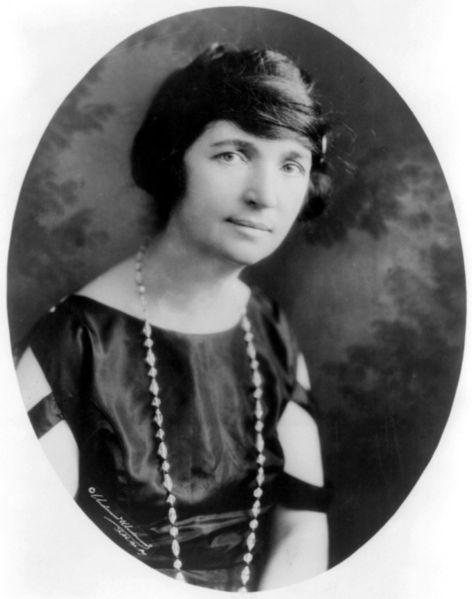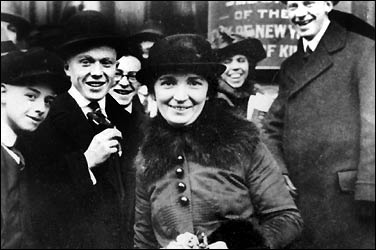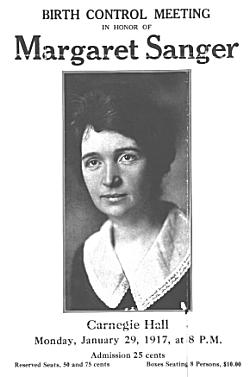|
|||||||||||||
1883-1966 By Punkerslut
You cannot discuss the uphill struggles for women's rights without mentioning Margaret Sanger's name. When she was just awaking to the world, birth control and contraception were illegal in the United States. And before she passed away, after decades of activism, the Supreme Court finally struck down a law the prohibited contraception. Her battle was a lone one -- it was in the face of the a nation full of churches, a government full of intolerant bigots. Her works were prohibited, and she and her family members were imprisoned multiple times. In her youth, her mother was pregnant eighteen times; seven were miscarriages. Her father was a Freethinker and a Socialist. He had invited Robert Green Ingersoll, a civil rights activist and speaker, to give a lecture at a local hall. But angry Christian protestors assailed Ingersoll with a wave of tomatoes. In multiple interviews, she claimed to be significantly influenced by Ingersoll's ideas. [*1] God's people organized into a violent mob, ready to destroy anything that came across their path; it was the calm philosopher's words about compassion that caught Sanger's ear. The Woman Rebel -- this was the first newsletter of Margaret Sanger, carrying valuable information on safe sex and reproduction. This was in an era where discussion about sexuality was illegal and zealously persecuted. The works of Sanger were virtually the only source of information for women to learn about their bodies. In 1911, she wrote "What Every Girl Should Know," but senator Comstock seized the pamphlets. Instead of reading Sanger's material, the United States government summed up its education policy for women. The article read, "What Every Girl Should Know: Nothing; by order of the U.S. Post Office." [*2] This was the state's opinion not about radical and revolutionary literature -- it was about censoring material that informed women about sexually-transmitted diseases. She was disgusted by a government that made freedom of speech its saint, and then burned her alive. On July 15, 1915, she wrote a response to Senator Comstock...
Margaret Sanger's materials were distributed by Eugene V. Debs' Socialist Party, as well as the Industrial Workers of the World -- the longest surviving federation of Anarchist unions in the United States. [*4] Her struggle was for the oppressed and exploited, the poor and underappreciated. The seas of tiny children, trodding into factories with sleep or energy, and then pouring out into the streets with amputations from dangerous machinery -- these were the ones she spoke for, organized for, wrote for. It was the innocent, the poor, and the least of these, that she suffered. We should not be surprised that the church has made her its greatest enemy. A century ago, Frederick Douglas, Susan B. Anthony, and Harriet Tubman were the church's self-declared enemies. Supporters of Pro-Life today are an evolution of this flock. Centuries ago, and some even today, claim that racial slavery was an institution made by the hands of god. [*5] Likewise, they wouldn't attack women and their liberties, unless they believed it to be a defense of the unseen. The reason why Carnegie and Rockefeller donated so much wealth to churches is obvious: the church has always convinced the teeming masses of children that they should obey their bosses. One put the helpless youth through fourteen hour days, small and cramped rooms, for some a miserable pay. The other sancified it as the will of god, and collected some of the proceeds. The church and the Capitalist: working hand in hand to exploit and oppress. Margaret Sanger fought the indignity of Capitalism. The motto of her newspapers is still a battlecry for Socialists and Feminists, "No gods! No masters!" The cries of children, mutilated and exploited and disregarded, fell to deaf ears, even when they begged those who spoke of God's infinite compassion. But Margaret Sanger heard this cry, and took it up as one of her chief causes. In 1911, she wrote...
Sanger's battle represents a struggle for women, as much as it represents those who wanted to speak and think freely. Her greatest difficulty in educating women about safe sex and hygiene were the laws that prohibited it. Very little information was publicly available that taught people about sex or relationships. The government and churches had agreed: it is important for millions of people to suffer and die from easily curable diseases. At least, it is more important than to allow people to educate themselves about healthcare. When Margaret Sanger's mother complained about how to avoid pregnancy, the doctor told her "Just tell your husband to sleep on the roof." [*7] These were the solutions offered to entire generations of women. Margaret Sanger did not want to just revolutionize the way people were allowed to access or use information. She wanted to change the way people interact with each other. In this respect, she hated the traditional, monogamous relationships. Like a government seeking to impose strict limitations on its citizens, she believed a jealous lover to be similarly oppressive. Even when she was married, she slept with others and encouraged her husband to do the same. In 1916, she opened America's first birth control clinic. It was raided by police only nine days after having opened. Sanger was arrested and served thirty days in jail. When asked by the prison intake what her religion was, she responded, "Humanity." In her autobiography, she recounts the situation, "He had never heard of this form of belief, and rephrased the question, 'Well, what church do you go to?' None. He looked at me in sharp surprise. All inmates of the penitentiary went to church..." [*8] Altogether, she was jailed eight times. In 1921, Sanger founded the American Birth Control League, which would later become the modern Planned Parenthood organization. In 1929, police raided her clinic and seized files. In 1957, she was named Humanist of the Year by the American Humanist Association. In 1965, the U.S. Supreme Court struck down a Connecticut law that outlawed contraception. And in 1966, she passed away, but her legacy continued. In 1972, the Supreme Court overturned a Massachusetts law which made it a crime to sell birth-control to unmarried couples. [*9] The next year, the Supreme Court legalized abortion for the first time in the United States. [*10] Sexual liberation had required decades of resistance to government and churches -- but in the end, people started to look at their bodies as their own. Margaret Sanger was an unbelievable woman; she was certainly not the first to envision liberty of reproductive rights, but she was the first to give everything she had for it. Hounded by police and judge, arrested and imprisoned, born into wretched poverty and exploited by the wealthy class. There was every obstacle in her way, but she was determined more than anyone before her to make reproductive rights a reality! The torturous misery she suffered did not stop her protests, her endless stream of articles and ideas, her williingness to see it to the very end. Very few other individuals can claim to have spent her life in the service of women. But there is a darker side to her philosophy and values. Margaret Sanger was an advocate of Eugenics -- a social movement that supported forced-sterilization of those considered to have inferior genetics. The country and time she lived in may have explained these attitudes, but they did not excuse them. Many earlier Feminists and Socialists had to support for such ideas, but many of them inherited the cruel ideas current to their time -- supporting wars and intolerance. The violent repression of Sanger's Feminist organization must have convinced her that her ideas were right. If the government reacted any other way except through violence, it would mean that they weren't really worried about her ability to change society. Later, she would reposition her Eugenics philosophy, arguing that it is up to the parents to know and decide. Quoting from a 1921 article, "The campaign for birth control is not merely of eugenic value, but is practically identical with the final aims of eugenics.... We are convinced that racial regeneration, like individual regeneration, must come 'from within.' That is, it must be autonomous, self-directive, and not imposed from without." [*11] Those of us following in Sanger's footsteps must be cautious about the ocean of lies left by tradition. Not surprisingly, Sanger did not attract praise from everyone. The American Life League writes about her, "Instead of helping the poor, she considered them slum dwellers (particularly Blacks, Hispanics, and Jewish immigrants) who would soon overrun the boundaries of their slums, contaminating the better elements of society with their diseases and inferior genes." [*12] The Republican Christopher Smith, in 2009, described Margaret Sanger as "a person who made no secret whatsoever of views that were antithetical to protecting fundamental human rights of the weakest and the most vulnerable..." [*13] There are many Pro-Life organizations that are arguing, without the slightest bit of evidence, that Margaret Sanger's pro-Choice organizations were simply trying to accomplish black genocide. [*14] Just to look through the works of Margaret Sanger, one is struck with awe at her compassion, her liveliness, and her open mind. Yet Sanger's love will rise out far above the religious bloodhounds. To those of us who are Freethinkers and Humanitarians, we will forever hold a torch of respect to Margaret Sanger; for her, and her battle for Socialism, Feminism, Reproductive Liberty, and Sexual Liberation. No other woman has done more than Sanger in liberating our bodies. Punkerslut,
Resources 1. "The Child Who Was Mother to a Woman" from The New Yorker, April 11, 1925, page 11.
|





